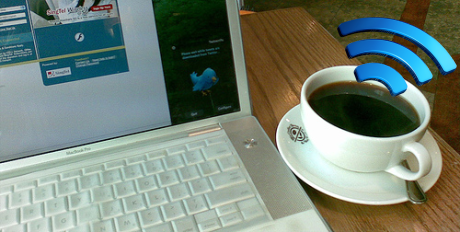Should public Wi-Fi access be 'free'?

Students are slowly beginning to move in to their new homes in and around their respective universities in preparation for the upcoming academic term. Most bills and subscriptions like electricity, gas, water, TV licence and other commodities are provided already and simply need a direct debit to continue without a cut in service.
Getting the broadband up and running can prove lengthy at times, however. In my case, going into my second year of university, it took me an entire month of wading through the bureaucracy of having a previous owner tagging the line.
It was like the Shawshank Redemption; except with more wading through crap and no bloody redemption.
This is on the day that the plan to open up the spectrum and provide a coast-to-coast wireless service, giving many of the estimated 100 million US citizens free broadband access was shot down by the FCC.

The Digital Economy Bill, in essence the United Kingdom's legislation to prevent piracy and hammer down on Internet related 'crime' could still threaten public wireless access in the country. Universities were at risk from closing down their wireless hotspots on campus because of the risk factor relating to students downloading copyrighted material over their networks.
So with this in mind, should public wireless hotspots be free? Taking into account wireless security, piracy and privacy, as well as the businesses who provide the network, frankly I personally still can't decide whether they should be or not.
Some of the arguments for free public Wi-Fi:
- Builds up geo-location facilities by allowing street mapping companies like Google drive by and collect information about these hotspots. You'll find more often than not these free Wi-Fi access points are unencrypted, so although all the traffic sent and received by Wi-Fi users could be read, drive-by hotspot detectors can use them for mapping purposes.
- Increases visitors to your business though it doesn't guarantee they will buy something. Many café and coffee shop owners open up wireless broadbad on their premises to attact customers, including those who are on a 'working lunch' and want to catch up on some paperwork while having a coffee and a bite to eat.
- It's free! What could be more of an argument? It automatically saves time by not having to enter in card details and the need to fill our expenses forms and suchlike, and it's 'plug-and-play' without any hassle. The cost often isn't the problem; in my experience it's the inconveneince of having to go through the payment rigmarole for what will inevitably be a short amount of time.
And some for the opposing team:
- It's not secure in that most public networks to allow everyone instant access is to leave them unencrypted so users can browse straight away. But as these networks are not encrypted, anything you do, say, visit, browse or write online could be intercepted. If you have shared folders on your laptop, they could be read too.
- Businesses suffer from scroungers maybe buying one cheap $1.50 coffee and sitting there for hours. Some coffee shops are pulling wireless access off their menus because frankly, a place without Internet access is relaxing especially in Silicon Valley.
- Credit cards can be used to prevent piracy in that you can prove exactly where you are at a certain time. Often the IP and unique MAC address of your computer will be recorded on connection, so that if you are accused of piracy and you have been naughty, they can prove it was in fact you. This acts as not only a deterrant not to pirate, but also acts as an incentive to use paid Wi-Fi access.
Free Wi-Fi access appears to be more of a backup solution than anything. And when I say 'backup', I actually mean 'backed into a corner'.
Most people will use public Wi-Fi in Starbucks, for example if they are absolutely desperate to use it. Many students moving into their new houses at the start of the academic year who are struggling to get their broadband turned on will be thankful for the free Wi-Fi access around town to use in the meantime.
While larger businesses could provide wireless broadband for free in their franchises, smaller café owners may struggle and understandably, with users taking advantage of the wireless access and not compensating the owners. And if users do pirate on a free network, the liability will fall with the café owners and the lawsuits could start flooding in. Unfair really, isn't it?